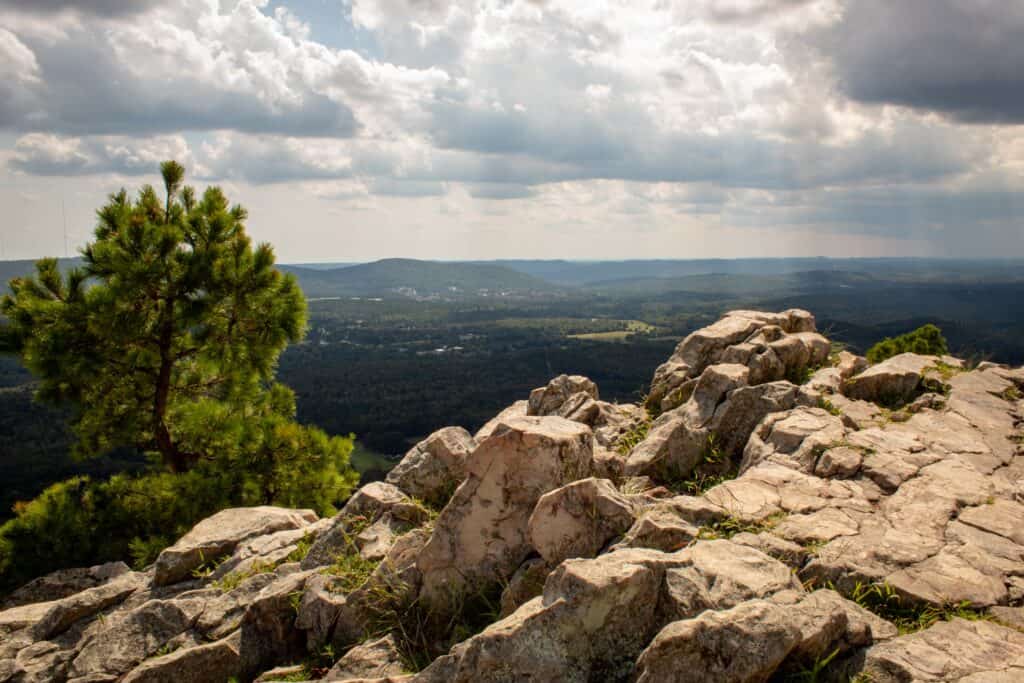Are you interested in living off-grid in Arkansas? If so, this is the guide for you! In this blog post, we will discuss all of the basics of living off-grid in Arkansas. We will cover everything from choosing a property to set up your home to generating power and growing your own food. So whether you are just starting out on your off-grid journey or you are looking for more information, this post has something for you!

What is living off-grid in Arkansas like?
If you’re tired of the hustle and bustle of city life, then living off-grid in Arkansas might be right for you. Imagine waking up each morning to the sound of birdsong, instead of honking horns and blaring sirens. Instead of spending your weekends fighting traffic, you could be hiking through the Ozarks or fishing in one of the many rivers and lakes. And when the sun goes down, you could stargaze from your porch instead of staring at your neighbor’s TV through a window.
Of course, living off-grid requires some sacrifices. You’ll need to be comfortable with “roughing it” in terms of amenities and creature comforts. But if you’re willing to trade creature comforts for peace and quiet, then living off-grid in Arkansas could be the perfect lifestyle for you.
What do I need to live off-grid in Arkansas?
The first step to living off-grid is finding the perfect property. And Arkansas has no shortage of beautiful places to call home. Whether you’re looking for acres of forest land to homestead or a small plot of land to set up your RV, you’ll be able to find it here.
Once you’ve found the perfect spot, you’ll need to start thinking about how you’ll power your home. If you’re planning on homesteading, then you’ll need to generate your own power using solar panels or a wind turbine. And if you’re just looking to set up an RV, you can get by with a generator or two.
Water is another important consideration when living off-grid. If you’re homesteading, you’ll need to collect rainwater or drill a well. And if you’re just living in an RV, you’ll need to make sure you have enough water tanks to last you between trips to town.
Finally, you’ll need to think about food. If you’re homesteading, then growing your own food will be a priority. But even if you’re just living in an RV, you’ll need to make sure you have enough non-perishable food to last you a few weeks in case of emergency.
Is Living Off-Grid in Arkansas Legal?
Off-grid living simply means not being connected to the three main public utilities which are water, sewer, and power. Most people choose to live off the grid to save money or to have a more sustainable lifestyle.
There are many different ways to achieve an off-grid lifestyle, but they all have one thing in common: they all require some level of self-sufficiency. For example, you might choose to generate your own power with solar panels or wind turbines. Alternatively, you might collect rainwater for drinking and irrigation. Whatever approach you take, off-grid living can be a rewarding experience.
In Arkansas, there are no state laws specifically prohibiting or regulating off-grid living. However, local ordinances may vary from town to town, so it’s always best to check with your local authorities before making any major changes. For example, some towns might require that you have a certain number of acres before you’re allowed to disconnect from the public water supply. In general, as long as you’re not causing any problems for your neighbors, it’s unlikely that you’ll run into any legal trouble for living off the grid in Arkansas.
You can read more here: RULES AND REGULATIONS PERTAINING TO ONSITE WASTEWATER SYSTEMS
Arkansas has many rules and regulations about off-grid systems that you should be aware of. If you want to install a large rainwater harvesting system, recycle graywater or use something other than septic for waste, you will have to follow the rules carefully. There are many requirements and permits you may need to get approval.
Rainwater Harvesting in Arkansas
Arkansas has no specific regulation or technical information that solely focuses on rainwater harvesting. There is a single provision in the 2014 Arkansas Code enacted by the General Assembly, that expressly allows the harvesting of rainwater subject to minor restrictions. Item (g) of the said Code states that rainwater harvesting systems are allowed for non-potable/non-drinking uses if and only if the following requirements are met:
- a licensed professional engineer in Arkansas designed the system
- cross-connection safeguards appropriate for the system are integrated therein
- the Arkansas Plumbing Code is duly complied with
Arkansas Has 52 State Parks!
Did you know that Arkansas has 52 state parks? That’s right, there are 52 state parks in Arkansas that offer a variety of activities for everyone to enjoy. From hiking and camping to fishing and swimming, there’s something for everyone. And best of all, most of these state parks are free to enter! So if you’re looking for a great way to spend a weekend, be sure to check out one of Arkansas’s state parks.
Hot Springs National Park
One of the most popular state parks in Arkansas is Hot Springs National Park. This park is home to a variety of hot springs, as well as hiking trails, camping sites, and picnicking areas. The best part about Hot Springs National Park is that it’s free to enter!
Arkansas Hunting Regulations
If you are 16 or older, an Arkansas hunting license is required to hunt wildlife unless you are on a licensed game-bird shooting resort that supplies pen-raised birds. A valid printed license, reusable hard card, or acceptable electronic format license must be in your possession when hunting. AWMA General Use Permit is required to hunt on public land. source: https://drive.google.com/file/d/1y3NsyKqHSUY3kPfJ8j5agSjVAx1gHiWx/view
Read more about Arkansas Hunting Regulations at https://www.agfc.com/en/hunting/general-hunting-regulations/
Growing Your Own Food in Arkansas
If you’re interested in growing your own food, Arkansas is a great place to do it. The state has a mild climate and rich soil that’s perfect for gardening. There are also many farmers’ markets and community gardens where you can buy fresh produce.
Further Resources:
See if you have any unclaimed property in Arkansas
The State of Arkansas holds onto the unclaimed property, such as money and valuables, that has been lost or abandoned. If you think you may have unclaimed property in Arkansas, you can search the state’s database to see if anything belongs to you.
